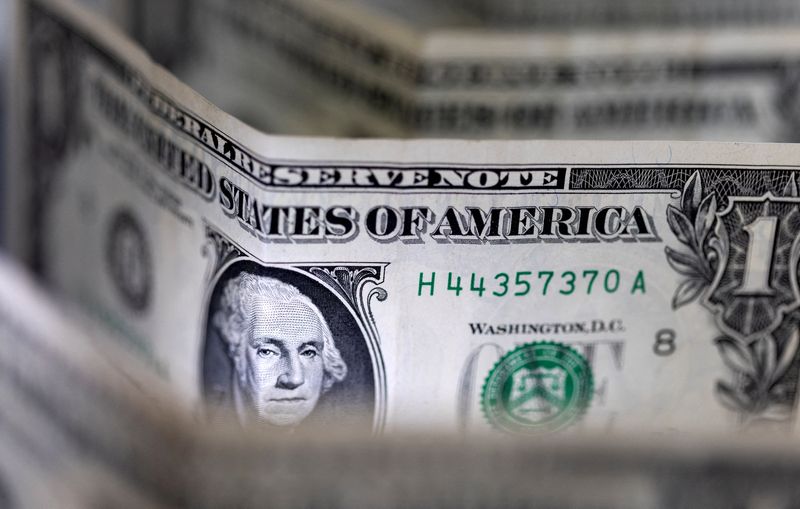 © Reuters
© Reuters
By Gina Lee
Investing.com – The dollar was down on Tuesday morning in Asia. The yen fought for a footing after its worst session in 16 months, as the Bank of Japan (BOJ) keeps bond yields down while they are rising sharply elsewhere.
The U.S. Dollar Index that tracks the greenback against a basket of other currencies inched down 0.01% to 99.045 by 11:49 PM ET (3:49 AM GMT).
The USD/JPY pair was down 0.46% to 123.33, with Japanese data released earlier in the day showing the jobs/application ratio at 1.21, and the unemployment rate at 2.7%, in February.
The AUD/USD pair inched down 0.10% to 0.7480, with Australian retail sales rising 1.8% month-on-month in February. The NZD/USD pair inched up 0.07% to 0.6899.
The USD/CNY pair inched down 0.03% to 6.3700 while the GBP/USD pair inched up 0.08% to 1.3094.
The Japanese currency fell as much as 2.4% against the dollar overnight and was at its lowest point since August 2015 before recovering to 124.24 in volatile Asian trading. The U.S. dollar remained broadly steady against other currencies, keeping the euro at $1.0988 and capping a recent rally in the Australian dollar.
BOJ bought a little more than $500 million in bonds on Monday and has pledged three more days of unlimited purchases to defend its 10-year yield target of 0.25%. This demonstrates the central bank’s resolve to keep its monetary policy ultra-easy and underscores a stark contrast with the hawkish stance adopted by the U.S. Federal Reserve which has added to the yen’s losses.
The yen is down nearly 7% in March 2022 to date and almost 10% on the Australian dollar. But the barely visible retreat in Japanese government bond yields (JGBs) is a sign that some investors doubt the longevity of Japan's dovish policy.
"Anyone who watched the Reserve Bank of Australia (RBA) 'cap' blow is probably excitedly and logically short JGBs right now hoping for a similar move in Japan rates," Spectra Markets president Brent Donnelly told Reuters, referring to RBA’s abandonment of its yield target in November.
The minutes from the BOJ’s latest meeting stressed the need to keep monetary policy ultra-loose, even as some signs of growing inflationary pressure emerge. However, some economists see building pressure for a shift if persistent yen weakness exacerbates inflation by raising import costs, particularly for energy, and predict that 125, roughly where dollar/yen peaked in 2015, is a key level.
"Japanese yen depreciation is a big problem for the Japanese economy because the economy, especially households, is facing rising inflation and yen depreciation could accelerate that," Deutsche Bank AG chief economist Kentaro Koyama told Reuters.
"If the dollar/yen rate exceeded 125 I'd expect some more severe verbal intervention."
Japanese Finance Minister Shunichi Suzuki also said earlier in the day that Japan will carefully watch foreign exchange market movement to avoid "bad yen weakening".

